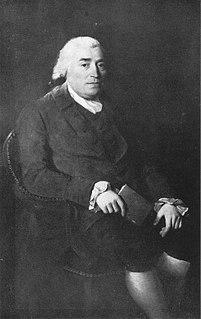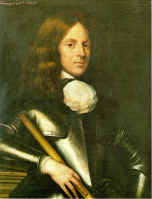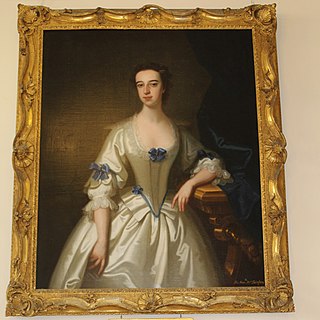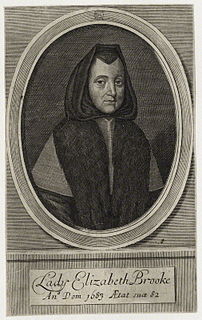
Culpeper County is a county located in the central region of the Commonwealth of Virginia. As of the 2020 United States Census, the population was 52,552. Its county seat and only incorporated community is Culpeper.
Earl of Bradford is a title that has been created twice, once in the Peerage of England and once in the Peerage of the United Kingdom. It was first created in 1694 for Francis Newport, 2nd Baron Newport. However, all the Newport titles became extinct on the death of the fourth Earl in 1762. The earldom was revived in 1815 for Orlando Bridgeman, 2nd Baron Bradford. The Bridgeman family had previously succeeded to the Newport estates. The title of the peerage refers to the ancient hundred of Bradford in Shropshire, and not, as might be assumed, to the city of Bradford, Yorkshire, or the town of Bradford-on-Avon in Wiltshire.

John Colepeper, 1st Baron Culpeper of Thoresway was an English royalist landowner, military adviser and politician who, as Chancellor of the Exchequer (1642-43) and Master of the Rolls (1643) was an influential counsellor of King Charles I during the English Civil War, who rewarded him with a peerage and some landholdings in Virginia. During the Commonwealth he lived abroad in Europe, where he continued to act as a servant, advisor and supporter of King Charles II in exile. Having taken part in the Prince's escape into exile in 1646, Colepeper accompanied Charles in his triumphant return to England in May 1660, but died only two months later.

Hollingbourne is a village and civil parish in the borough of Maidstone in Kent, England. The parish is located on the southward slope of the North Downs to the east of the county town, Maidstone. The parish population is around 900 and has three conservation areas: Upper Street in the village centre and the outlying hamlets of Broad Street and Eyhorne Street.

Thomas Fairfax, 6th Lord Fairfax of Cameron was a Scottish peer. He was the son of Thomas Fairfax, 5th Lord Fairfax of Cameron, and Catherine Colepeper, daughter of Thomas Colepeper, 2nd Baron Colepeper.

Thomas Colepeper, 2nd Baron Culpeper of Thoresway, was the colonial governor of Virginia from 1677 to 1683.
Sir Cheney Culpeper (1601–1663) was an English landowner, a supporter of Samuel Hartlib, and a largely non-political figure of his troubled times, interested in technological progress and reform. His sister Judith was the second wife of John Colepeper, 1st Baron Colepeper.

The Northern Neck Proprietary – also called the Northern Neck land grant, Fairfax Proprietary, or Fairfax Grant – was a land grant first contrived by the exiled English King Charles II in 1649 and encompassing all the lands bounded by the Potomac and Rappahannock Rivers in colonial Virginia. This constituted up to 5,000,000 acres (20,000 km2) of Virginia's Northern Neck and a vast area northwest of it.

Robert Fairfax, 7th Lord Fairfax of Cameron MP (1707–1793), was a Scottish peer and politician. He died at Leeds Castle, England, which he inherited from his mother Catherine, daughter of Thomas Culpeper, 2nd Baron Culpeper of Thoresway.

Colonel Nicholas Spencer, Jr. (1633–1689) was a merchant, planter and politician in colonial Virginia. Born in Cople, Bedfordshire, Spencer migrated to the Westmoreland County, Virginia, where he became a planter and which he represented in the Virginia House of Burgesses. Spencer later served as Secretary and President of the Council of the Virginia Colony, and on the departure of his cousin Thomas Colepeper, 2nd Baron Colepeper in 1683, was named Acting Governor (1683–84), in which capacity Spencer served until the arrival of Governor Lord Howard of Effingham. Spencer's role as agent for the Culpepers helped him and his cousin Lt. Col. John Washington, ancestor of George Washington, secure the patent for their joint land grant of the Mount Vernon estate.
There have been two baronetcies created in the Baronetage of England for members of the Culpeper family of Kent and Sussex. Both are extinct.

Dame Elizabeth Brooke was an English religious writer, part of whose writing of Christian precepts survives, and was matriarch of a landed manorial family in East Suffolk, East Anglia, during the English Civil War and Restoration periods. An extended account of her religious thought and practice, written by her minister at Yoxford, Suffolk at the time of her funeral, was printed together with some of her own precepts. Her stance and practice was, like that of her brother Lord Colepeper, politically loyal to the Crown, and her allegiance was therefore to the established Church, but she and her husband, Sir Robert Brooke, lived and worked in close connection with the more Puritan or Presbyterian spirit among the gentry and magistracy of the neighbourhood, and supported a moderate and inclusive policy towards ministers inclined to Nonconformism within the church at large.
Sir Thomas Colepeper was an English politician who sat in the House of Commons at various times between 1614 and 1629. He supported the Royalist cause in the English Civil War. He is known also as a writer on usury.

All Saints Church is a parish church in Hollingbourne, Kent. It was begun in the 14th century and is a Grade I listed building. The church contains numerous monuments to the local Culpeper family.
Thomas Colepeper, was an English Member of Parliament.
Culpeper, Colepeper, or Culpepper is a surname, first written "de Colepeper" in the 12th century in Kent, England. Notable people with it include:

Frances Culpeper Stephens Berkeley Ludwell, most commonly styled Lady Frances Berkeley after her second marriage, was a leader of the Green Spring faction of Virginia politics in the seventeenth century and wife to three colonial governors.











